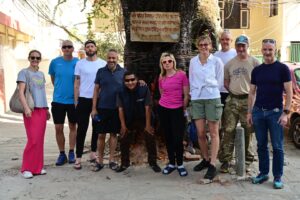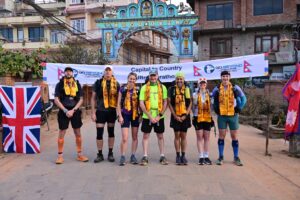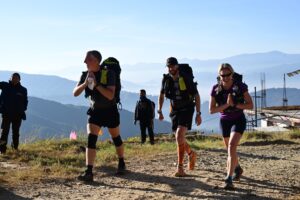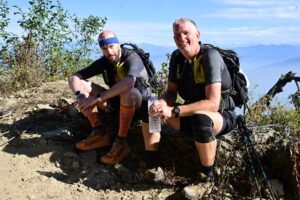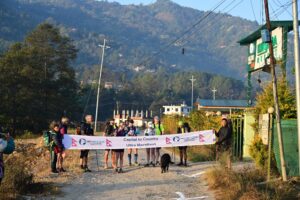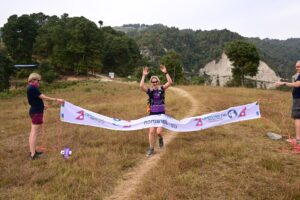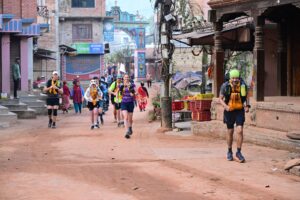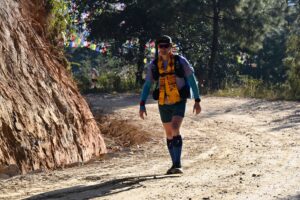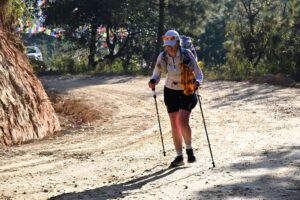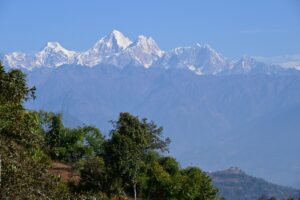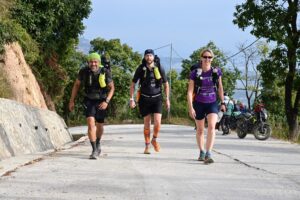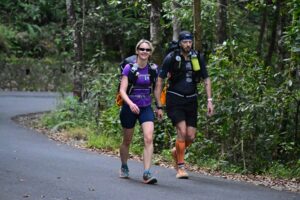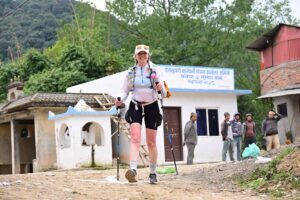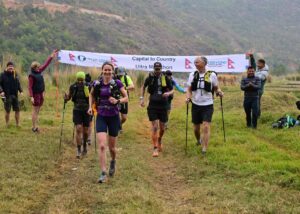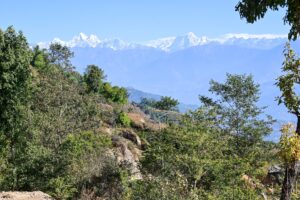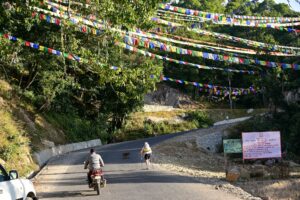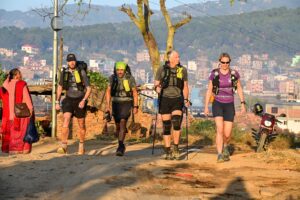Capital to Country: The Spiritual Race That ‘Combines UTMB and the Marathon des Sables’
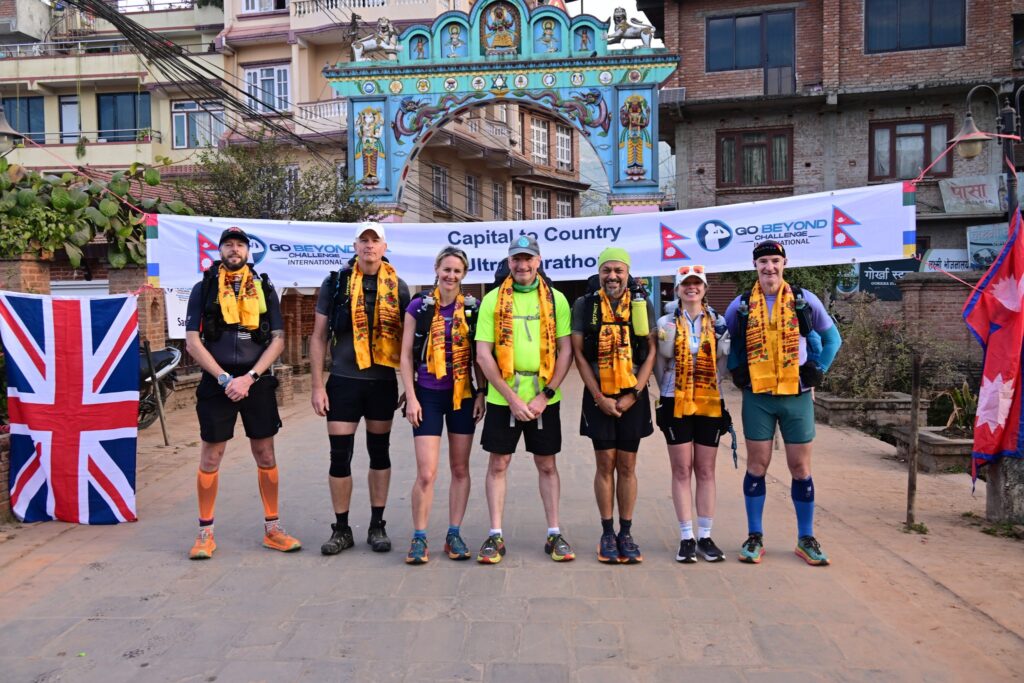
How do you take on a five-day, 123-mile race up from capital to country that includes steep inclines and goes through a landscape so remote you often don’t see anyone for hours?
Smash out the miles as fast as you can? Use your skills as an endurance runner to conserve energy? Drag yourself ever onwards in a battle between mind and matter?
Emily Moore’s Unique Approach
Emily Moore had a different approach to the inaugural Capital to Country Ultra Marathon across Nepal. She power-walked it.
Taking place in late November and early December, the self-sufficient race started in the sprawling capital city of Kathmandu. Along the way it combined severe climbs, jaw-dropping temples and holy sites, and remote villages.
Emily, who first went to the Himalayas 28 years ago when she was just 18, is currently plotting to take on the formidable Marathon des Sables, the six-day, 250km ultra marathon that takes place in the Sahara Desert. The experienced Ironman triathlete said the heat of the desert means she is unlikely to be able to run that event, hence her new-found walking tactics.
“I’ve been experimenting, spending the summer wild camping and sleeping on the North Northumberland coast,” she said.
“I power-walked Capital to Country and had a very different event than the others. I went to a Nepalese wedding, I went to temples. The guy who was with me at the back was very proud of his country and we have made friends. He showed me all the important buildings.
“On the last day, we went past his school, which is a charity school where his brother is the headmaster. The kids were at the windows looking at us, then they all came out and they blessed me. I smelt like Turkish Delight, which was an actual delight because I had been smelling like a dog for days.”
The Allure of Nepal
But Emily had another, deeper reason for travelling to Nepal. Her previous trip had been the experience of a lifetime, but after getting married not long after she returned life became more routine.
It was only when she got divorced last year, that she decided she wanted to return to Nepal.
She said: “It was one of the hardest periods of my life and with two young children to look after, and a busy job as a teacher, there wasn’t much time for me.
“When the chance came up to join Go Beyond and a group of just six other runners to run from Kathmandu City to the fabulously remote Lamaland village, it wasn’t one I was going to miss out on. It was time to rediscover Emily.
“It was the trip of a lifetime. I feel privileged to have been there, to have seen the people, to have seen the country. And to have met friends for life.”
ADVERTISEMENT

Dharmesh Mistry’s Himalayan Dream
As Emily powered her way towards spiritual and physical success, Dharmesh Mistry paused as he reached the top of another gruelling climb.
He took a sharp intake of breath, trying not only to slow his fast-beating heart but to allow his brain to take in the vista before him.
Lush green hillsides spread out before him, a river snaking its way through the valley below. But his eyes were focused on what was in the distance. Looking down on everything before him were a set of snow-peaked giants.
It isn’t every run that allows you to gaze out at the majesty of the Himalayas.
But, Dharmesh said, the Capital to Country Ultra isn’t just any race: “It is like a dream, something to give you kudos and to tell your grandkids.”
Simon Hollis on the Intimate Beauty
Simon Hollis, the founder of Go Beyond Challenge which runs the event, described it as an “intimate experience combined with the breathtaking beauty of Nepal.”
Dharmesh, an experienced ultra runner who has completed a host of 100-mile races as well as the famed Marathon des Sables (MDS), went further.
“I thought this was like UTMB (Ultra-Trail du Mont Blanc) meets MDS. A five-day, self-sufficient race with long climbs and huge distances. Who wouldn’t want to do that?,” he said.
“Yes, MDS is a similar distance and in the heat, but the climbs aren’t like this and the terrain isn’t as varied. The scenery is brilliant. The people are so friendly and the course lived up to all the challenges we thought it would bring.”
The ‘we’ Dharmesh talks about is himself and fellow Capital to Country competitor Tarne Westcott, who would go on to win the race. The pair have been running events together ever since a pub bet resulted in them doing the London to Birmingham 50-miler more than a decade ago.
“We’re comfortable running in different situations and different environments,” Tarne said. “A lot of that apprehension that might go with running in a new area or a new terrain didn’t exist for us.”
Tarne, who has attempted to run UTMB three times but been denied by injury and circumstance, said the relaxed nature of Capital to Country was something that proved attractive to the small group of seven runners who took on an event designed to be an adventure and experience as much as an all-out race.
“I think the opportunity to do something completely different with no pressure, and I don’t mean that in a negative way, meant we could enjoy the adventure, enjoy the experience, soak up the scenery and the views, and enjoy every day,” he said.
Tarne Westcott’s Unexpected Competition
But the competitor in Tarne couldn’t stay hidden for long.
A relaxed, pre-race visit to Kathmandu’s Monkey Temple, where a blessing from local monks was punctuated only by a mischievous monkey grabbing a Sprite bottle as a souvenir of the trip, was swapped for day one’s 27-miles along jeep tracks cut in the mountain sides, taking in tree covered hills and breathtaking drops. And the start of the real race.
That first day was won by another experienced ultra marathoner and MDS-alumni, Helen Ramwell, but only after Tarne made a late charge to catch her.
“It didn’t start off being competitive,” Tarne said, “but then it went the opposite way.
“I don’t know what Simon made of it all, because all he probably heard me say was, ‘where’s Helen?’ Helen loves a good old competition and a good old race. We’d gone out there just to enjoy it, but I found myself on the first day, quite by accident, chasing Helen down.
“Before, I knew it I found I was moving quite comfortably and thought, why not?”
Although he only finished second that day, Tarne’s ‘why not’ saw him win three stages over the five days, but it didn’t take away from the experience of running through “beautiful” Nepal.
“It was almost like a holiday, genuinely a break, a trip, some excitement, seeing a new location, seeing the terrain, being in the mountains. We all loved that,” he said.
The Grueling Terrain of Capital to Country
Capital to Country doesn’t mess around when it comes to either distance or elevation, with constant ups and downs testing runners’ quads, thighs and hamstrings.
Day two, from Kasibanjayang to Bhakundebesi via the spectacular Dukhiel viewpoint, saw the runners complete another 23 miles while the third morning arrived with a somewhat rude awakening from a chanting monk and barking Nepalese dogs. Its 30-mile route passed through the historic home of the Tamang Empire, winding along cobbled roads, and past plentiful temples and religious sites.
A shorter 16-mile route on day four took in some serious climbs before finishing at the remote Lamaland village, where the runners were greeted with garlands of flowers and an array of prayer flags and flower bowls.
The final day’s 26-miles started and finished at Lamaland, with all seven competitors safely completing the race – and at least one finishing with spiritual as well as ultra marathon goals achieved.
Helen met Dharmesh and Tarne when completing the MDS, but it was a race she also ran alongside her father, Richard, who sadly passed away during the Coronavirus pandemic.
Helen Ramwell’s Emotional Journey
Running through Nepal proved to be a chance for her to say goodbye and complete one last race with him: “Part of the journey for me was about just having a bit of space to process what had happened.
“Running felt like a very apt way of doing it. Being out in the mountains and having the headspace running gives you, to go through all of that was incredible.
“I know my dad was with me on my shoulder.”
She said there was a purity about the “melting pot of different cultures and different religions” found in Nepal and the people she encountered.
‘There was a moment where we’d been running for three or four hours without having seen anyone and I came across a bloke who had a massive piece of plywood that was a metre wide and three-metres long. He was carrying it on his head,” she said.
“We saw women bent double, carrying massive loads on their backs, and yet every single one of them stopped and smiled at us.
“We were doing this weird thing that they probably couldn’t get their heads round at all, but yet we were still having that human connection with people.
“I think that is incredible. It just brings you back down to a basic human purpose and puts life into perspective.”
Owen Jones: A Journey of Recovery
If Helen and Tarne fell in love with Nepal while running, Owen Jones’ journey saw him captivated by the often painful but spectacularly rewarding sport of ultra running.
A recovering alcoholic who only gave up the booze four years ago, Owen had nevertheless always been a proficient marathon runner. But his first experience of an ultra hadn’t gone to plan.
“I’d run the 100km Race to the Stones,” he said, “but it didn’t hold any appeal for me.
“We’d set off at sunrise on what was the longest day and still finished it in darkness, having sort of set ourselves the target of finishing without needing to put our head torches on. The enjoyment wasn’t there as much as I thought it would be. It was just too bloody hard.”
But he was persuaded to put his doubts to one side by a “stroke of marketing genius” on Facebook. A post advertising the Capital to Country Ultra told runners to ‘work out how much it costs, be told by your other half that it’s ridiculous and they can spend the money elsewhere, and book it anyway’.
And that’s what he did.
Beyond the Finish Line
Despite the event getting off to the worst possible start when the strap on his rucksack snapped after just four miles of day one, Owen slowly became immersed in the joy of extreme endurance sport.
“I was looking through all the pictures from the event and there is one of myself and Emily coming in to the finish on the last day,” he said.
“Our arms are aloft and we’ve just got the happiest faces you can possibly imagine. That picture encapsulates the whole thing.
“It was just a trip about getting to a very happy place, having been through some pretty shitty places on the way through.”
How do you take on a five-day, self-sufficient, 123-mile race up steep inclines and through a landscape so remote you often don’t see anyone for hours? Anyway you want.
Photo Credit: Adrian Howes Photography
ADVERTISEMENT

Craig Lewis is a former journalist and broadcaster from Northampton in the UK.
An enthusiastic but distinctly average runner, he is the co-founder of the Running Tales Podcast and Substack newsletter, which aim to tell the extraordinary stories of everyday runners.











